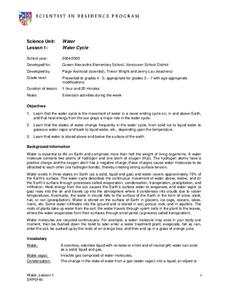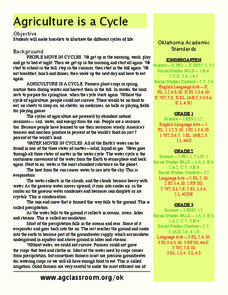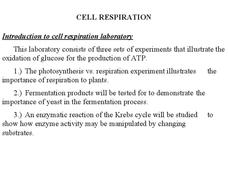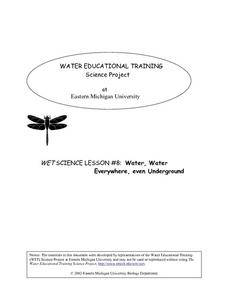It's About Time
The Water Cycle
Explore the water cycle with a hands-on earth science activity that prompts pupils to measure the amount of water normally transpired by plants. After they describe the flow of the water cycle and provide examples of how human activities...
Curated OER
Leaves, the Sun, and the Water Cycle
As a way to combine life and physical science, or simply as an investigation of plant transpiration, this lesson is sure to inspire! Middle schoolers capture the moisture given off by plants that are placed in different conditions. They...
Curated OER
What's Up With the Water Cycle?
Students explore the water cycle. Students identify the stages in a water cycle and create a PowerPoint presentation based on their knowledge.
Alabama Learning Exchange
WATER You Doing to Help?
Auntie Litter is here to educate young scholars about water pollution and environmental stewardship! Although the 15-minute video clip is cheesy, it's an engaging look at the water cycle and conservation. Learners start by illustrating...
K20 LEARN
Transpiring Trees: Plant Transpiration and the Water Cycle
Looking for a tree-rific addition to your water cycle unit? Teams of young foresters examine the role of transpiration in the water cycle through a week's worth of activities. Pupils analyze how trees take in and transport water during...
Curated OER
Water Cycle
Young scientists explore Earth elements by conducting an experiment. They define water vocabulary terms such as condensation and precipitation. In addition, they conduct a water experiment in which they build a terrarium, so they can...
Nuffield Foundation
Observing Water Moving Through Plants
We know plants assist in the water cycle, but how do plants get water from the ground into the air? Through a series of demonstrations or labs, scholars observe the movement of water through plants. They microscopically view the cells...
Curated OER
Using Environmental Models to Determine the Effect of Acid Rain on an Ecosystem
Demonstrate to your middle school science learners how chalk breaks down in a weak acid. Discuss what affects acidic rain might have on ecosystems. Lab groups then choose one of two questions: "How does acid precipitation affect an...
It's About Time
The Nitrogen and Phosphorous Cycles
How do we affect the ecosystem, and what can we do to preserve it? Pupils explore chemicals that promote and inhibit plant growth, then discuss the importance of nitrogen and phosphorus to the survival of organisms and describe how...
Curated OER
Agriculture is a Cycle
Students explore cycles in nature. In this cross curriculum agriculture lesson, students define "cycle" and research weather and planting folklore. Students make a bracelet in which individual colored beads represent the many "cycles" of...
Curated OER
The Water Cycle
Third graders investigate water formations by conducting an experiment. In this water properties lesson, 3rd graders utilize pie tins, sponges and salt shakers to create an evaporation and saturation experiment. Students collaborate in...
Curated OER
Cell respiration
Three lab guides are given here that detail experiments to illustrate the oxidation of glucose for the production of ATP. The first will compare photosynthesis and respiratio and show theimporatnce of both to plants. The next will show...
Curated OER
Alcoholic Fermentation in Yeast
Biology classes will bubble with excitement as they complete this assignment. Beginning with an informative overview of cellular respiration and fermentation processes, the highlight comes as an experiment in determining the rate of...
Science & Plants for Schools
Photosynthesis - A Survival Guide
Young scientists learn what it takes for life on Earth to survive with this series of photosynthesis resources. Offering twelve different activities ranging from independent practice worksheets to in depth scientific experiments, this...
Curated OER
Dirt Babies
Dirt babies are an excellent way to show young botanists the plant life cycle. They explore the functions and industry behind grasses before growing some of their own. Use the informational text here and consider implementing some...
Curated OER
Plant Transpiration
Students conduct various experiments to investigate plant transpiration. In this biology lesson, students explain how this process helps maintain the hydrologic cycle. They measure the rate of water loss in plants using a potometer.
Curated OER
Animal Life Cycles
Students participate in numerous activities to gather information about parts of the life cycle. In this life science lesson, the teacher choose from a number of activities to create or support an interdisciplinary unit about the life...
Curated OER
Water Pollution and Food Chains
Sixth graders study the effect of pollution in our food chains. In this plant biology lesson, 6th graders first experiment with pollution by placing a carnation in colored water. Next they use a food chain triangle to see the concept of...
Nuffield Foundation
Nitrogen-Fixing Bacteria in Root Nodules of Leguminous Plants
Fixin' to add a great resource to your plans? Scholars perform an experiment to investigate nitrogen-fixing bacteria from plant roots. Along the way, they learn about the concepts of symbiosis and mutualism.
Curated OER
Building a Butterfly Garden
Students examine the habitat and life cycle of a butterfly. In this early childhood lesson plan, students identify the parts of a butterfly, as well as the stages of the butterfly life cycle. Students also plant a garden in which they...
Curated OER
Electron Transport System Made Fun and Easy:
Students identity the components of electron transport system through role play. They explain the role of intermediate energy carriers to the production of ATP molecules. They describe the relationship of electron transport system to...
Curated OER
Water, Water Everywhere, Even Underground
The "Engage" section of a wetlands lesson plan asks young ecologists to examine a wetlands poster. You can easily find one online and display it using a projector. Pupils immerse a piece of sandstone and a piece of granite in water to...
Serendip
Where Does a Plant's Mass Come From?
Where does the mass for a growing tree come from? Scholars consider a few different hypotheses and guess which is correct. They then analyze data from different experiments to understand which concepts science supports.
Curated OER
Nitrogen Fixation, OR What a Gas!
Learners illustrate the adaptation and co-evolution of organisms. They examine set up an experiment to determine the effect of adding the Rhizobium bacteria to a group of legume seeds.

























